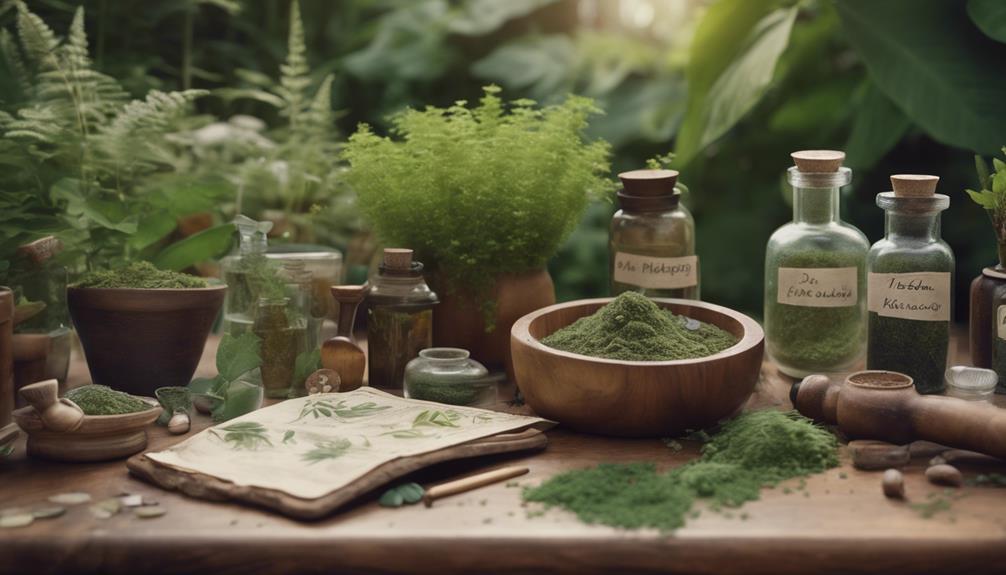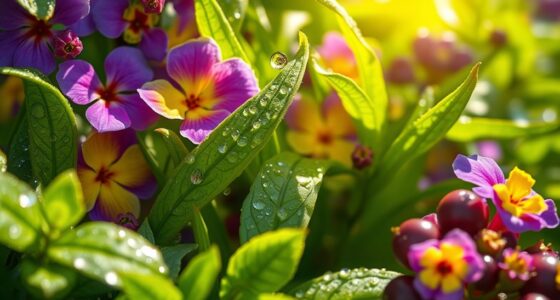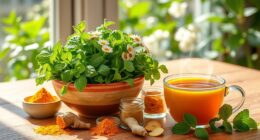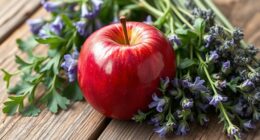As we explore the world of plants and healing, we often get confused between herbology and herbalism. However, these two terms have distinct meanings. Herbology is the scientific study of plants and their medicinal properties, focusing on plant identification, cultivation, and theoretical aspects like biology and biochemistry. On the other hand, herbalism is the practical application of this knowledge to promote healing and wellness, emphasizing personalized treatments and holistic approaches. While herbology provides the foundation, herbalism puts it into practice. As we dig deeper, we'll uncover the intricacies of these complementary practices and uncover the secrets of plant-based healing.
Key Takeaways
• Herbology is the theoretical study of plants, focusing on identification, cultivation, and scientific understanding, whereas herbalism is the practical application of herbs for healing and wellness.
• Herbology emphasizes theoretical knowledge, while herbalism puts that knowledge into practice with personalized treatments and hands-on herbal remedies.
• Herbology blends scientific study of plants with medicinal properties, whereas herbalism combines traditional healing practices with herb application for holistic health.
• Herbology provides the foundation for herbal knowledge, focusing on plant identification, cultivation, and biology, whereas herbalism focuses on treating the whole person, not just symptoms.
• While herbology is concerned with the scientific understanding of plants, herbalism is concerned with the practical application of herbs for healing and wellness.
Defining Herbology and Herbalism
When we explore the world of botanical medicine, it's important to understand the distinctions between herbology and herbalism, two interconnected yet distinct fields that are often used interchangeably.
While they're closely related, they've different focuses and applications. Herbology is the theoretical study of plants, their properties, and traditional medicinal uses. It involves delving into plant identification, cultivation, and the scientific understanding of plant biology.
On the other hand, herbalism is the practical application of herbs for healing and wellness. It emphasizes creating personalized herbal treatments based on individual needs and symptoms.
As we navigate the domain of botanical medicine, it's crucial to recognize that herbology provides the foundation, while herbalism puts that knowledge into practice. Both fields play integral roles in holistic health practices and alternative medicine.
The Science of Herbology

How do we reveal the secrets of medicinal plants, and what drives the scientific inquiry that underpins the field of herbology? We investigate the intricacies of botanicals, examining their biology, chemical composition, and effects on the human body.
As we navigate the world of herbology, we employ a multidisciplinary approach, combining biology, chemistry, and pharmacology to understand the therapeutic potential of herbs for various health conditions. Our pursuit of knowledge is fueled by the desire to uncover the mysteries of herbal medicine, and to develop effective treatments that harness the power of nature.
- We identify and cultivate medicinal plants, extracting active compounds for use in herbal remedies.
- We study the chemical makeup of plants, analyzing their bioactive compounds and their effects on the body.
- We investigate the pharmacological properties of herbs, examining their interactions with the human body.
- We develop methods for extracting and processing plant materials, ensuring the quality and efficacy of herbal products.
- We continually update our knowledge, integrating new research and findings into our understanding of herbology.
Holistic Approach of Herbalism

As we explore the holistic approach of herbalism, we find that it's rooted in the understanding that our bodies and minds are intricately connected.
We're recognizing that the natural healing process isn't just about treating physical ailments, but also about addressing emotional and spiritual imbalances.
Body and Mind Connection
We often find that herbalism's holistic approach is rooted in the understanding that our body, mind, and spirit are intricately connected, and that true wellness can only be achieved by addressing the interconnectedness of these aspects.
Unlike herbology, which primarily focuses on the medicinal properties of plants, herbalism takes a more all-encompassing approach to health. By considering the interconnectedness of our body, mind, and spirit, herbalism aims to promote overall wellness rather than just treating isolated symptoms.
Some key aspects of herbalism's holistic approach include:
- Emphasizing the interconnectedness of physical, emotional, mental, and spiritual well-being
- Focusing on treating the whole person, not just symptoms
- Integrating lifestyle changes, emotional support, and spiritual practices with herbal remedies
- Addressing the root causes of ailments rather than just symptoms
- Viewing health as a balance of physical, emotional, mental, and spiritual well-being
Natural Healing Process
In our pursuit of peak health, we turn to herbalism's natural healing process, which honors the body's innate ability to heal itself when supported with plant-based remedies and a holistic approach.
This approach acknowledges that our bodies have an incredible capacity for self-healing, and by providing the right conditions, we can access this natural process. Herbalism's natural healing process involves addressing the root cause of health issues, rather than just treating symptoms.
By considering the interconnectedness of mind, body, and spirit, herbalists aim to restore balance and harmony within the body, promoting overall well-being. This holistic approach recognizes that health is a dynamic state influenced by lifestyle, environment, and emotional well-being.
Understanding Herbology Studies
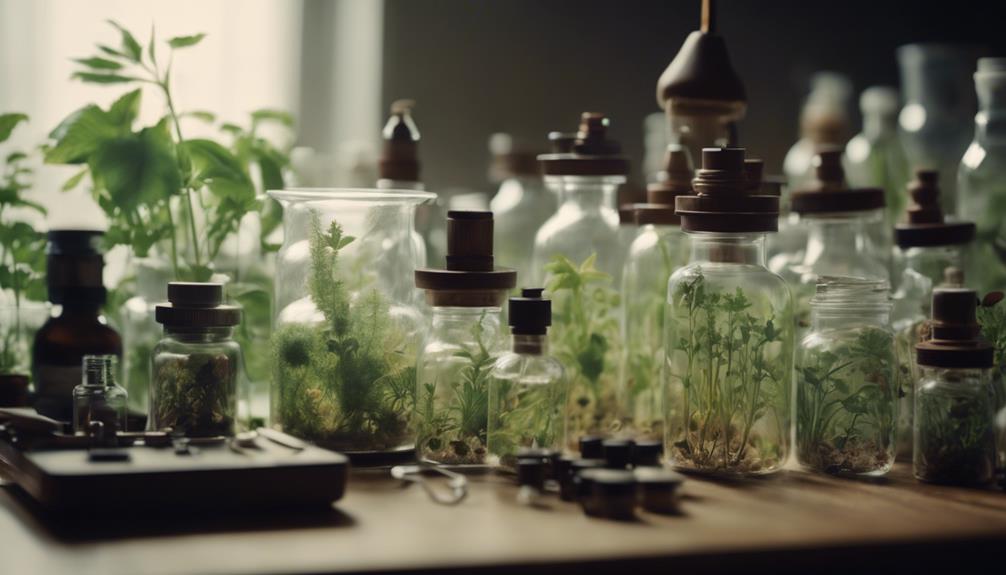
As we delve into the field of herbology, we'll examine the fundamental aspects of this discipline.
We'll investigate the botanical classification of plants, which involves understanding their characteristics, properties, and relationships.
Botanical Plant Classification
Classifying plants into their respective kingdoms is an important step in herbology studies, allowing us to identify and understand the distinct characteristics of various plant species. In botany, understanding plant classification is vital for herbologists to accurately identify and categorize different plant species. This knowledge enables us to differentiate between various medicinal plants and their properties, ensuring their effective utilization for medicinal purposes.
In herbology studies, we explore the intricate world of plant biology, focusing on the structures and functions of different plant species. This understanding of botany provides a foundation for us to identify, categorize, and utilize plants effectively for medicinal purposes.
Here are some key aspects of botanical plant classification in herbology:
- Plant classification is based on the kingdoms of biology, emphasizing plant identification and taxonomy.
- Understanding botany is essential in herbology studies to identify plants accurately and study their characteristics.
- Herbology explores the intricate world of plant biology, focusing on the structures and functions of different plant species.
- Learning about plant classification in herbology helps herbologists differentiate between various medicinal plants and their properties.
- Herbology studies provide a foundation for herbologists to identify, categorize, and utilize plants effectively for medicinal purposes.
Medicinal Property Analysis
We explore the intricacies of medicinal property analysis, revealing the therapeutic benefits and chemical composition of herbs that contribute to their healing properties.
As we investigate further into herbology studies, we comprehend that herbologists scrutinize the biological mechanisms through which herbs interact with the body. This involves identifying the active compounds in plants that contribute to their healing properties.
Through research and experimentation, herbologists uncover the specific medicinal properties of different herbs, exploring their chemical composition and therapeutic benefits. By analyzing the medicinal properties of plants, we can enhance our knowledge of how they affect human health.
This knowledge enables us to harness the therapeutic potential of herbs, developing new treatments and remedies. As we continue to study the medicinal properties of plants, we may discover new ways to prevent and treat diseases, improving overall health outcomes.
Types of Herbalism Practices

In our exploration of herbalism, we've identified five distinct types of practices that have evolved to address various aspects of health and wellness. These diverse approaches to herbalism highlight the complexity and richness of this ancient tradition.
- Traditional herbalism: Focuses on ancient healing traditions and cultural practices using medicinal plants.
- Clinical herbalism: Involves the practical application of herbs in clinical settings to address specific health concerns.
- Shamanic herbalism: Integrates spiritual and energetic aspects into herbal practice for healing and transformation.
- Scientific herbalism: Emphasizes evidence-based research and studies to understand the pharmacological effects of herbs.
- Community herbalism: Promotes wellness and sustainability by engaging with local communities and sharing knowledge about herbal remedies.
These distinct approaches to herbalism demonstrate the versatility and adaptability of this holistic practice. By understanding these different types of herbalism, we can better appreciate the depth and breadth of this ancient tradition.
The Role of the Herbologist

As herbalism practitioners, our primary goal is to identify the root cause of illnesses and choose appropriate herbs based on symptoms, performing clinical exams to assess patients and create personalized herbal prescriptions for treatment.
As herbologists, we take on a critical role in the herbalism practice, focusing on the scientific study of medicinal herbs to promote health and wellness. We're responsible for selecting the most effective herbs, combining them in various forms such as teas, capsules, bath salts, oils, and creams to create tailored treatments.
Our education and training vary, with some of us holding graduate degrees in clinical herbal medicine. When working with patients, we emphasize safety and regulations, ensuring they consult licensed herbalists, follow dosage instructions, and exercise caution when interacting with medications.
Cultural Significance of Herbs

Herbs have played a profound role in the cultural heritage of societies worldwide, with diverse traditions and practices surrounding their use for healing and spiritual purposes. As we explore the cultural significance of herbs, we find that different cultures have unique herbal traditions, such as Traditional Chinese Medicine, Ayurveda, Native American herbalism, and European herbal lore.
- Herbs are deeply intertwined with cultural rituals, ceremonies, and beliefs, reflecting a profound connection between nature and human societies.
- Cultural practices related to herbs often pass down through generations, preserving ancient knowledge and wisdom about the healing properties of plants.
- Understanding the cultural significance of herbs can provide insights into the historical, social, and spiritual aspects of different societies and their relationship with nature.
- Herbalism is deeply rooted in many cultures, with herbs being used not only for medicinal purposes but also for spiritual and ceremonial uses.
- The cultural significance of herbs highlights the importance of preserving traditional knowledge and promoting cross-cultural understanding in the field of herbalism.
History of Herbal Medicine

As we explore the history of herbal medicine, we're struck by the rich legacy of ancient healing practices that have shaped our understanding of plant-based remedies.
From the Ebers Papyrus to Traditional Chinese Medicine, we'll examine the early roots of herbalism and how they've evolved over time.
Ancient Roots of Healing
We uncover the ancient roots of healing by delving into a rich history that spans 60,000 years, with evidence of medicinal plant use found in burial sites.
As we explore the history of herbal medicine, we find that ancient civilizations like the Egyptians, Greeks, and Chinese developed sophisticated systems based on herbs and botanical remedies.
Some notable highlights of herbal medicine's ancient roots include:
- The Greek physician Hippocrates, known as the 'Father of Medicine,' utilized herbal medicines like garlic and willow bark for healing.
- Traditional healing practices in Ayurveda, Traditional Chinese Medicine, and Indigenous cultures heavily rely on herbal remedies for health and well-being.
- The Renaissance period saw a revival of herbal medicine knowledge in Europe, leading to the publication of herbals and the establishment of botanical gardens.
- Herbal medicine has ancient roots dating back to 60,000 years ago, with evidence of medicinal plant use found in burial sites.
- Ancient civilizations developed sophisticated herbal medicine systems based on herbs and botanical remedies.
Early Herbal Remedies Used
In ancient civilizations, healers relied on a remarkable array of botanicals, harnessing the medicinal properties of plants like garlic, aloe vera, and ginseng to treat a wide range of ailments.
We're talking about ancient healers who recognized the potential of herbal remedies to alleviate suffering and promote wellness. In those times, traditional medicine systems like Ayurveda and Traditional Chinese Medicine emerged, heavily reliant on herbal remedies to address various health concerns.
From digestive issues to infections, herbal medicine played a crucial role in treating a multitude of conditions. The knowledge of these early herbal remedies was passed down through generations, laying the foundation for the diverse field of herbal medicine we know today.
As we explore the history of herbal medicine, it's evident that ancient healers were pioneers in harnessing the power of plants to heal and protect human life. Their discoveries paved the way for the development of modern herbalism, which continues to evolve and grow to this day.
Modern Applications Emerging
Today, herbal medicine's rich legacy has sparked a multitude of modern applications, with researchers, clinicians, and consumers alike recognizing its potential to complement conventional medical approaches. As we explore into the modern era, we're witnessing a significant shift in the perception of herbal medicine. Medical doctors, in particular, are acknowledging the value of herbal remedies in integrative health care.
Some of the key modern applications emerging include:
- Approximately 25% of pharmaceutical drugs are derived from botanical sources, highlighting the significance of herbal medicine.
- Nearly one-third of Americans use herbs, with approximately 70% not informing their doctors, indicating a gap in communication regarding herbal medicine usage.
- Health care providers consider various factors when recommending herbs, including possible interactions with prescription medications, emphasizing the importance of informed choices.
- Herbal medicine is gaining acceptance as part of holistic health care, with providers incorporating it into thorough treatment plans for a wide range of health conditions.
- With the growing recognition of herbal medicine's potential, we're seeing increased research and collaboration between medical professionals and herbalists to develop evidence-based herbal therapies.
As we progress, it's crucial to continue exploring the possibilities of herbal medicine, ensuring safe and effective integration into modern health care systems.
Modern Applications of Herbs

With the rising demand for natural health solutions, modern applications of herbs have given rise to a diverse array of products and treatments that cater to various health and wellness needs. We're seeing a surge in the popularity of herbal supplements, which are now available in convenient forms like capsules, powders, and topical creams. These formulations have made herbal treatments more accessible and user-friendly.
| Herb | Health Benefit | Modern Application |
|---|---|---|
| Turmeric | Anti-inflammation | Capsules, teas, and topical creams |
| Ginger | Digestive health | Herbal supplements, teas, and tinctures |
| Chamomile | Relaxation and anxiety relief | Teas, essential oils, and bath bombs |
| Ashwagandha | Stress relief and immune-boosting | Herbal supplements, powders, and adaptogenic blends |
Research has shown the effectiveness of herbs like turmeric for inflammation, ginger for digestion, and chamomile for relaxation. Adaptogenic herbs like ashwagandha and rhodiola have gained popularity for their stress-relieving and immune-boosting properties. As herbal remedies become increasingly incorporated into mainstream healthcare practices, we're seeing a new wave of personalized herbal treatments offered by herbalists and naturopathic physicians.
Blending Science and Tradition

As we explore the modern applications of herbs, we're reminded that the roots of herbalism lie at the intersection of science and tradition. This blending of science and tradition is what sets apart the herbologist from the herbalist.
A herbologist is more focused on the theoretical aspects of plants, studying their biology and biochemistry, whereas a herbalist combines traditional healing practices with practical application of herbs for holistic health.
When we examine the differences between herbology and herbalism, we see that:
- Herbology emphasizes plant identification and cultivation, while herbalism focuses on using herbs for remedies.
- Theoretical aspects of herbology include biology and biochemistry, while herbalism involves hands-on herbal treatments.
- Herbologists study the theoretical aspects of plants, while herbalists apply practical knowledge to create personalized treatments.
- Herbology blends scientific study of plants with their medicinal properties, focusing on theoretical knowledge.
- Herbalism combines traditional healing practices with practical application of herbs for holistic health.
Frequently Asked Questions
What's the Difference Between Holistic and Herbalist?
When we consider the terms 'holistic' and 'herbalist,' we often wonder what sets them apart. Essentially, a holistic approach treats the whole person – physical, mental, emotional, and spiritual – whereas a herbalist focuses specifically on using herbs for healing.
While holistic practices encompass various alternative therapies, herbalism centers on the medicinal properties of plants. In short, holistic care addresses imbalances with a range of therapies, whereas herbalists rely on the healing properties of herbs.
At What Point Can You Call Yourself an Herbalist?
Surprisingly, only 34% of self-proclaimed herbalists hold a formal degree in herbal studies.
So, at what point can you call yourself an herbalist?
We believe it's not just about throwing around a title.
To truly earn the label, you need formal education, certifications, or degrees in herbal medicine, as well as expertise in plant medicine and clinical experience.
Anything less, and you're just scratching the surface of this complex field.
Why Is It an Herbalist and Not a Herbalist?
We often wonder why it's an 'herbalist' and not a 'herbalist'.
The answer lies in the word's etymology. Derived from the word 'herb', referring to plants used for medicinal purposes, the suffix '-ist' is added to form the noun 'herbalist'.
This follows standard English language rules for word formation and pronunciation. Using 'herbalist' maintains consistency and accuracy in terminology within the herbalism community, avoiding unnecessary variations that can lead to confusion.
What Is the Difference Between a Botanical Herb and a Medicinal Herb?
When we explore the world of herbs, we often encounter two terms: botanical herbs and medicinal herbs. So, what's the difference?
Simply put, botanical herbs are plants used for culinary, aromatic, or ornamental purposes, while medicinal herbs are chosen for their healing properties.
We use botanical herbs like basil and thyme to flavor our dishes, whereas medicinal herbs are prepared specifically to address various health issues.
Conclusion
As we weave together the threads of herbology and herbalism, it's clear that these two distinct approaches to working with plants are intertwined like the tendrils of a vine.
While herbology is rooted in scientific inquiry, herbalism takes a more holistic approach, embracing the cultural and traditional significance of herbs.
By blending science and tradition, we can reveal the full potential of herbal medicine, cultivating a deeper understanding of the intricate relationships between humans, plants, and the natural world.

